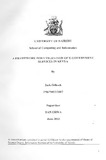| dc.description.abstract | The purpose of this study was to assess the framework for the utilization of eGovernment
services in Kenya. The specific objectives were to assess the extent to which
citizens in Kenya would use e-Government services, determine the factors that contribute
to e-Government services use in Kenya, find out whether the intention to use eGovernment
services differs across selected personal factors and to develop a framework
for the utilization of e-Government Services from a citizen perspective in Kenya. The
motivation of the study; It is not clear which factors influence the utilization of the eGovernment
Services in Kenya for reasons that although these factors are well analyzed
in the published literature on e-Government for developed countries, there is a need to
understand, evaluate them in the context of Kenya as there is very little that is written.
The study used a descriptive research design. As a result, stratified random sampling was
used to select 50 users from each of the eight Kenya provinces. A questionnaire was
used for data collection. Descriptive statistics and inferential statistical methods were
applied.
Results indicated that the overall intention to use e-Government services was high in
Kenya as majority of the respondents indicated that they intended to use e-Government
services. In addition, results also indicated that intention to use e-Government services
was higher for lower end services and declined as the complexity of the service
increased. Results further revealed that the technological factors that significantly
influenced intention to use e-Government services included awareness, perceived ease of
use, perceived usefulness, savings, perceived trust, perceived information quality,
satisfaction and ICT experience. Results also revealed that the intention to use eGovernment
services differs across the various types of occupations, levels of education
and internet experience. However, gender and age of e-Government user did not
influence the intention to use e-Government services.
The study has implication for theory building since the study validates several constructs
found in UTAUT Model, Web Trust and in the Diffusion of Innovation (DOI) Theory.
The study also has implications for practice. These include several recommendations
from practice. Several recommendations were made in an effort to enhance the utilization
of e-Government services in Kenya. The recommendations were in line with research
findings. The government of Kenya should create awareness about its e-Government
services as doing so would lead to an increased intention to use. The government should
enhance trust as doing so would increase the intention to use e-Government services. For
instance, the government should seriously address the rampant website hacking by
ensuring that websites have firewalls, and the use of robust web hoisting database
servers. The government may also enhance perceived ease of use by involving users in
the development of e-Government services. Furthermore, the government may ensure
quality by having its websites and product offering updated regularly. It is suggested that
further study on specific e-Government services should therefore be investigated. | en |

